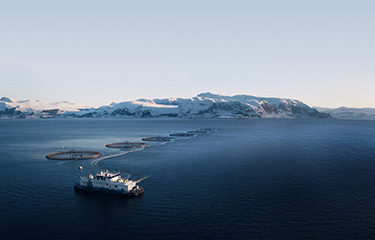Tax proposal leads Lerøy, Mowi to terminate license-capacity purchases

Norwegian salmon producers Lerøy Seafood Group and Mowi have both canceled planned acquisitions of additional maximum allowable biomass (MAB) under Norway’s so-called “traffic-light system” of permitting in response to the government’s proposal to introduce a new 40 percent resource rent tax on salmonid farming.
On 3 October, Lerøy announced that it would not proceed with the 614-metric-ton (MT) MAB that it had purchased earlier in 2022 for NOK 123 million (USD 11.3 million, EUR 11.6 million), stating that increasing the overall tax rate from 22 to 62 percent “creates unreasonable framework conditions for the industry in Norway,” and also that it changes the scope and incentives for investments in areas other than maintenance capex.
Lerøy also said that all major new investments in the group’s value chain in Norway would “regrettably be put on hold” pending the decision of the Storting, Norway’s parliament. Additionally, its board of directors has decided to halt its NOK 420 million (USD 38.7 million, EUR 39.6 million) investment already underway to increase processing capacity at Skjervøy in Troms.
“Norway’s aquaculture industry is something as unique as a globally competitive form of food production that is sustainable both from an environmental/climate perspective and financially. Norway needs to step up, not least in these difficult times, and continue to facilitate production of food for the world’s population,” Lerøy CEO Henning Beltestad said.
Beltestad added that the government should be working together with salmon farmers.
“In recent decades, this decentralized district-based industry has built a unique value chain based on expertise and willingness to take risks. This value chain has significant potential for further development, but then the government needs to work together with the industry and provide predictable framework conditions," Beltestad said. "Introducing a resource rent tax will halt development of the industry’s value chain and hence reduce all its direct and indirect ripple-effects along the coast.”
A similar statement was made by Mowi on 4 October, with the company advising that it would be canceling its acquisition of 914 MT MAB for a total value of NOK 183 million (USD 16.9 million, EUR 17.3 million) as “the government’s tax proposal means that Mowi can no longer justify the purchase price.”
Mowi said that it respectfully advises the government to reconsider its resource tax proposal and warned that it could take its operations elsewhere.
“The aquaculture industry is of great importance for the future of Norway, and it is in the nation’s best interests to see it grow. However, this proposal will severely damage the ability and willingness to make investments. A tax rate of 62 percent will put an end to many significant investment plans along the Norwegian coast, leading not only to less employment locally but also to a massive diversion of funds away from coastal communities,” it said. “Mowi is a global company and salmon farming is not bound by geography – it can take place in sea and on land anywhere in the world, close to its major markets. If the proposal for 62 percent tax is approved by parliament, then the Norwegian aquaculture industry faces the greatest setback in its 50-year history, and over time, Norway stands to lose its leading position within aquaculture to other countries.”
Fellow Norwegian salmon companies Cermaq and Nordlaks have also immediately halted new investments in their respective Norwegian operations in response to the new tax proposal.Cermaq has shelved new investments expected to double the NOK 5 billion (USD 460.9 million, EUR 471.8 million) it has already invested in the Nordland and Finnmark farming regions since 2016, including a new hatchery in Hasvik municipality. Meanwhile Nordlaks had identified possible investments totaling NOK 7 billion (USD 645.2 million, EUR 660.6 million) for the next six-year period. It has now stopped work on a new slaughterhouse, filleting factory, and head office at Børøya in Vesterålen, and its investment in three land-based hatcheries has also been put on hold.
Together, these four investments totaled around NOK 5 billion (USD 460.9 million, EUR 471.8 million) and were expected to create hundreds of new jobs. SalMar and Nova Sea have also curtailed their planned investments.
The new proposal on the resource rent tax has been put out by government for consultation. Committees at Storting will start processing the state budget this month before its likely adoption in December.
Photo courtesy of Mowi






Share